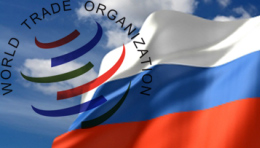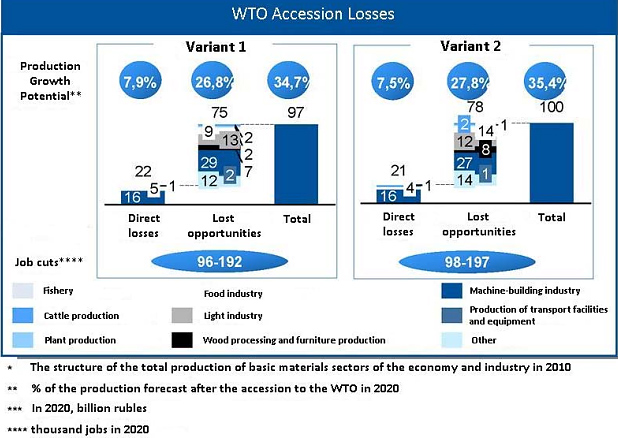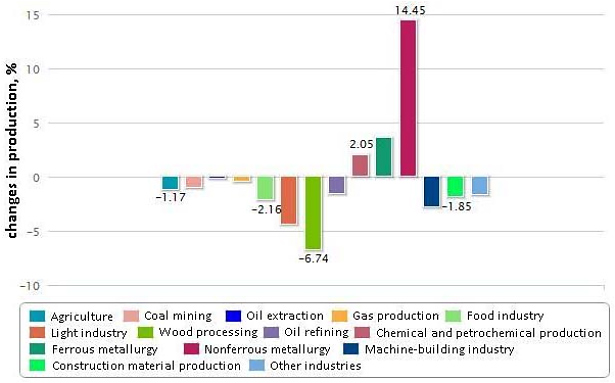Accession to WTO: Obligations for Russia*
 he Protocol on Russia's accession to the Marrakesh Agreement Establishing the World Trade Organization took effect on August 22. Thus, the Russian Federation became the 156th member of the WTO.
he Protocol on Russia's accession to the Marrakesh Agreement Establishing the World Trade Organization took effect on August 22. Thus, the Russian Federation became the 156th member of the WTO.
The document was signed in Geneva on December 16, 2011. Ministers of the WTO member states approved Russia's accession into this organization after 18 years of negotiations.
As a WTO member state Russia undertakes all obligations under the Marrakesh Agreement Establishing the World Trade Organization. Interim periods for the market access liberalization are set at two to three years, and five to seven years for more sensitive goods.
Russia's Obligations
In July, the Council of the Eurasian Economic Commission approved an updated Common Customs Tariff (CCT) taking into account Russia's obligations to the WTO. It will come into force on August 23. According to the preliminary estimates, with this new version of the Common Customs Tariff, the average weighted rate of import customs duty will go down from 9.6% to 7.5-7.8%.

As for a third of goods the reduction will occur the next day. First of all, this means that import customs duties increased during the crisis period of 2008 – 2009 will be reduced to the initial level.
The automotive industry, agricultural sector, agricultural machine-building industry, and light industry are sensitive industries where some economic and financial difficulties may arise due to the new conditions caused by Russia's WTO membership. The Russian government is working on ways of adapting the economic sectors to the WTO requirements, while continuing to support, particularly, agriculture.
Support programs for farm equipment production, shipbuilding and aviation construction will be re-formatted in accordance with the WTO requirements and state support will go directly to the producers. Moreover, a number of administrative measures are planned, for instance, in the line of customs administration.
One of the key issues of WTO accession was support for the Russian agricultural sector. In line with the commitments taken, Russia will now be able to spend $9 billion on farming in 2012-2013. The volume of financial injections is expected to go down to $4.4 billion in 2018. Speaking about the terms of Russia's accession to the WTO, Economic Development Minister Andrei Belousov has said it will be a long time before Russia fully implements the support volumes outlined in the agreement.
In July, the government approved a state program of support for agriculture for 2013-2020, with 1.509 trillion rubles allocated from the federal budget. Over the next eight years the funding will total 2.28 trillion rubles, including 770 billion rubles from the regional budgets, Minister of Agriculture Nikolai Fedorov said.
Export benefits
There will be some changes in Russian exports. The European Union is to lift the quotas on Russian metal imports as soon as Russia joins the WTO. Moreover, in accordance with arrangements the government approved tripling of export quotas for Russian pine and spruce in 2013.
The tariff quotas for exports of common spruce or European silver fir will be tripled in 2013 – from 2082.2 thousand cubic meters in 2012 to 6246.2 thousand in 2013.
The quota for the European Union will be increased from 1986.9 thousand cubic meters in 2012 to 5960.6 thousand cubic meters in 2013, for the rest of the world – from 95.3 thousand cubic meters in 2012 to 285.9 thousand cubic meters in 2013. The quota for exports of common pine will also be increased from 5346.1 thousand cubic meters in 2012 to 16038.2 thousand cubic meters in 2013.
The export quota for the European Union will be increased from 1215.3 thousand cubic meters in 2012 to 3645.9 thousand cubic meters in 2013. For other countries, the quota will be increased from 4130.8 thousand cubic meters in 2012 to 12392.3 thousand cubic meters in 2013.
Moreover, the Government of the Russian Federation previously confirmed the rates of export customs duties for Russian goods brining them in line with its new commitments taken after joining the World Trade Organization. The Russian Federation is increasing the export duty for soya beans to 20%, but not less than 35 Euros per ton. Although it was supposed earlier that the reduced rate of 5% would be in force till the end of September.
 The rates of export duties for natural gas, oil gases, and gaseous hydrocarbons remain unchanged. The rate for natural gas remains at the level of 30%, for the rest – 5% of their customs value.
The rates of export duties for natural gas, oil gases, and gaseous hydrocarbons remain unchanged. The rate for natural gas remains at the level of 30%, for the rest – 5% of their customs value.
The decision does not affect export customs duties for oil and some oil products, the rates for which are set by the Russian government monthly taking into account the average price for Urals oil in the world markets.
The advantages for Russia
According to the Ministry of Economic Development, the WTO membership will give the Russian Federation a number of advantages. For instance, simplified customs procedures yield economic operators US$900 billion annually in the world market and US$18 billion annually in Russia, according to the Organization for Economic Cooperation and Development (OECD).
According to the World Bank, Russia's accession to the WTO will bring a GDP increase of about 3.3% per year, thus leading to an expected 11% GDP increase (about US$162 billion) due to a positive impact on the investment climate over the course of the next ten years. Russia will get these estimated benefits every year, i.e. they will be recurrent with all the regions being of benefits. However, those subjects of the Russian Federation which will succeed in attracting foreign direct investments will benefit most. According to the World Bank's forecast, the North-West region including St. Petersburg and the Far East will benefit most.
According to the Ministry of Economic Development's estimates, the elimination of barriers for Russian exports after joining the WTO will create up to 40 thousand jobs in the country. Moreover, the maximum amount of customs duties for formalization of goods in the Russian Federation will be reduced by 3.3 times, to 30,000 rubles from a previous 100,000 rubles. Tax regulations for Russian and foreign goods are to be unified as of the date of the country's accession to the WTO.
According to the Ministry of Economic Development, obvious benefits for consumers from the reduction of trade barriers after Russia's accession to the WTO are cost-of-living reduction due to a cheapening of both imported goods and domestic goods. As a result, prices could fall not only for finished imported goods and services but also for domestic goods, particularly those produced with imported components.
Maxim Medvedkov, the head of the Russian delegation during the WTO negotiations, Director of Trade Negotiations Department of the Ministry of Economic Development of the Russian Federation has earlier said that prices for goods may begin to fall in 3-5 years, but inflation may quite compensate for this fall.
 Direct budget losses caused by Russia's accession to the WTO may be 188 billion rubles in 2013 and 257 billion rubles in 2014, however, in reality they will be lower due to higher foreign trade volumes and, consequently, the taxable base, and an increase in duties collected, Andrey Belousov, the head of the Ministry of Economic Development of the Russian Federation said (according to the materials of “RIA-Novosti”).
Direct budget losses caused by Russia's accession to the WTO may be 188 billion rubles in 2013 and 257 billion rubles in 2014, however, in reality they will be lower due to higher foreign trade volumes and, consequently, the taxable base, and an increase in duties collected, Andrey Belousov, the head of the Ministry of Economic Development of the Russian Federation said (according to the materials of “RIA-Novosti”).
*1 Originally published in “Investments. Facts and comments.” Issue 3 (22)


